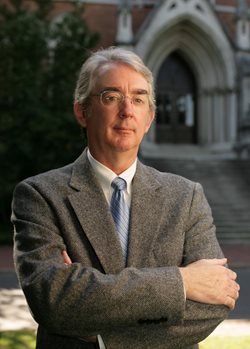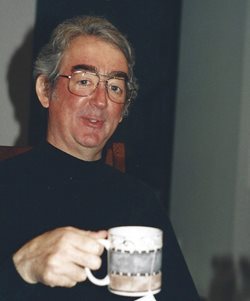About
In Memoriam: Dennis G. Hall, 1948 - 2024
Jan 06, 2024

Dennis G. Hall, former faculty member and director of the Institute of Optics at the University of Rochester, and later Vice Provost for Research and Dean of the Graduate School at Vanderbilt university passed away on January 6, 2024. Dennis served in many roles at OSA/Optica, including serving on the board of directors, as instructor of many short courses, and as a mentor to both his students and other young researchers throughout the optics community. He was a fellow of both OSA/Optica and SPIE.
A survey of hot topics in integrated photonics and optical physics over the last decade would overwhelmingly point to themes such as silicon-based photonics, plasmon-polariton enhanced physical processes (plasmonics) including OLED emission, propagation of complex polarization states, and nanoparticle-enhanced energy harvesting. Long before most of these were hot topics or represented a compelling commercial need, Dennis Hall, his students, and close colleagues, were working on them. The world of integrated photonics and optical physics has not been the same since. His former student Martijn de Sterke, now at the University of Sydney in Australia, commented that “The PhD projects in Dennis’ group were very carefully chosen and often anticipated research by several years, and sometimes even longer.”
Dennis was born in Belleville, IL and attended St. Mary’s Grade School and later Althoff Catholic High School. Ever a curious mind, he was an avid reader, writer, and amateur HAM radio operator. His HAM radio activities continued into retirement and, long after long distance calls became included in phone packages, he was communicating via radio with his friend and colleague Jim Wyant (University of Arizona). He received his B.S. in Physics at the University of Illinois (1970), and later a PhD in Physics from the University of Tennessee, Knoxville (1976), completing his dissertation at Oak Ridge National Laboratory.
1980 Dennis and his family moved to Rochester, New York so he could join the faculty of the Institute of Optics at the University of Rochester, where he established a highly successful track record of research, publications, and teaching over the next 20 years. Dennis was a lovin g husband, father, and mentor known for his strong moral center and quirky sense of humor. His cared deeply about the well-being of his students and, no doubt because of this, his research group was a very happy one. Before discussing the science, regular group lunches were punctuated with humorous discussions on the latest television shows, movies, or books. Dennis was also known for inserting lyrics to well-known popular songs into his lectures on electromagnetic theory and taught courses rated very highly even by struggling students.
g husband, father, and mentor known for his strong moral center and quirky sense of humor. His cared deeply about the well-being of his students and, no doubt because of this, his research group was a very happy one. Before discussing the science, regular group lunches were punctuated with humorous discussions on the latest television shows, movies, or books. Dennis was also known for inserting lyrics to well-known popular songs into his lectures on electromagnetic theory and taught courses rated very highly even by struggling students.
He served as Director of the Institute of Optics from 1993-2000 and was known as one who cared deeply about the lives and careers of all of the faculty and students of the Institute while setting a model for excellence in research and teaching. In search of a change, Dennis joined Vanderbilt University’s Administration in 2000. He served as the first Vice Provost for Research and later Dean of the Graduate School for the next 15 years, where, by many accounts, he significantly elevated the role of research at Vanderbilt.
Stepping outside the optical sciences, Dennis loved to analyze issues ranging from oil production and climate change to the national debt and education. He remained, to the end, committed in his belief in the power of science and education to improve society. He wrote numerous articles on these and other topics both for the Tennessean newspaper and elsewhere. Coincidentally, an article of his on this subject appeared in the print version of the Tennessean just one day after he left this world.
Tributes:
Ian A. Walmsley Provost of Imperial College (London), former OSA/Optica President, and Optica Fellow writes, “I was really privileged to have known Dennis: a brilliant colleague, an inspiring leader and a true friend. Dennis was an exceptional person, both as a scientist and as an academic leader. He was thoughtful in all the best senses of that word - in his research, in his leadership roles and most importantly in his interaction with people. He was always generous, insightful and empathetic, qualities that made him one of a very few academic leaders I’ve come across with who really understood what a vision for an institution could be, and how to make it happen. The Institute of Optics owes him a great deal - as do I. “
Susan Houde-Walter, 2005 Optica President, Optica Fellow, and former Professor of Optics, U. Rochester, writes “Dennis drew faculty of all stripes together with his easy wit and humor. He held court at the Faculty Club every day for lunch, seamlessly shifting between contemporary issues in optics to reviews of the latest episode of Seinfeld. He paid particular attention to junior faculty and attracted a constellation of researchers working in the area of optoelectronics. His seminal work in silicon photonics is well-known. Dennis was also an astute observer of human interactions. He was curious about scientific creativity and designed a “cluster model” for the Institute of Optics, in which grad and undergrad students would be clustered together in various locations to stimulate scientific discourse and engage undergraduates. He left for Vanderbilt University before funds could be raised for a new building, but that was later done by his successors.”
Michael Raymer, former OSA/Optica Board of Directors member, Optica Fellow and former faculty colleague at the Institute of Optics, writes, “Dennis was a nearly unique blend of serious, thoughtful, and playful. His opinions on scientific, cultural and social matters were always deeply reasoned, intelligent and humane. He could run a large organization while earning the trust of those below him in the administrative chain and he could regale his friends with popular songs having lyrics replaced by his own hilarious versions. Dennis was curious about everything and wanted to try to solve any problem he found intriguing. Together we failed to solve the problem of what quantum mechanics really means, but we had considerable fun trying.”
Jim Kafka, 2024 Optica President-Elect and Optica Fellow writes, “The 1980s were an amazing time at the Institute and Dennis played a pivotal role in making it so. Several early members of his group, Ted Dziura, Bulent Kurdi, Martijn de Sterke and Tom Brown have become lifelong friends of mine as they continue to leave their mark on industry and academia. I know Dennis was proud of his students and the impact they continue to make leaves a meaningful legacy.
Sharon Weiss, Optica Fellow, Cornelius Vanderbilt Professor of Engineering, Professor of Electrical Engineering, Professor of Materials Science & Engineering, Professor of Physics and Director, Vanderbilt Institute of Nanoscale Science and Engineering, writes, “I had the honor of knowing Dennis first as an amazing teacher at the Institute of Optics and then as a mentor, colleague, and friend at Vanderbilt University. Dennis was a visionary who recognized the importance of supporting interdisciplinary science while he helped transform graduate education at Vanderbilt, leading to a period of dramatic growth in research activity after his arrival. His love of science, as well as data and statistics related to current global events, was legendary during the many graduation speeches he delivered at Vanderbilt. Regardless of his role as Director of the Institute of Optics, Vice Provost for Research and Dean of the Graduate School at Vanderbilt, classroom instructor, or mentor, Dennis was always genuine in the care and consideration he gave to everyone with whom he interacted.”
Thomas Brown, Optica Fellow, Director of the Institute of Optics and student of Dennis during the 1980’s writes “Dennis was a visionary in identifying important and interesting scientific problems and anticipating future applications. He wasn’t perfect in his assessment of market influences, insisting that Betamax video tape technology must eventually win because of its technical superiority. But when it came to the important things – the people in his life – Dennis was remarkable in his encouragement and guidance both in personal and in scientific matters.”
Obituary and tributes supplied by The Institute of Optics, University of Rochester.
March 2024
